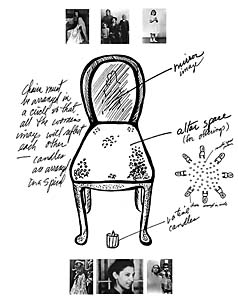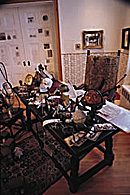 |
|
|
 |
|
A ceremonial aesthetic has grown from this process of critical invention that characterizes my work . Through the use of bricole miniaturization, the use of domestic objects, Catholic imagery, natural and organic ephemera, mirrors and dispersal, I have pursued a personal and collective narrative of Chicano/Mexicano history. The adoption of this form and process for more than twenty years has produced a politicizing spirituality that has served my community and given meaning to my life. In my own work a feminine Rasquachismo or Domesticana, as I call it, is a driving force in creating a critical space that is simultaneously contestatory and passionately affirming of our histories as women and our situation of struggle. The series I am presenting in this exhibition extends this Domesticana into the importance of womenÕs role in the life of the family, in the history of resistance and in the tradition of labor connected to the Mexicano/Chicano cultures. The piece titled The Circle of the Ancestors narrates through a circle of chairs eight historic moments through eight historic women our cultural genealogy as Chicanas. The circle refers to the arrangement of the eight chairs facing inward around a spiral of candles placed on the floor. The chair, as a metaphor of the body, recalls the suffering and sacrifice present in the lives of these women. At the same time the circle of chairs is a recalling of the intimacy and collective strength of women's lives in the home, in the fields, even in the Church. The eight figures refer to the ancient, the Mexican Cuatlique, and Coyolxauhui; the Virgen de Guadalupe; the colonial paintings, the Castas; the colonial nun and scholar Sor Juana Inez de la Cruz; the revolutionary woman soldier, Adelita and my own Abuelita (grandmother); the Chicana farm worker; the Pachuca/Chola and my First Holy Communion. The women represented in the chair altars offer us a circle of time where we remember our future, constructing for ourselves a spiritual and cultural genealogy as Mexicana/ Chicana women. San Francisco, California - January, 1995 |
 |